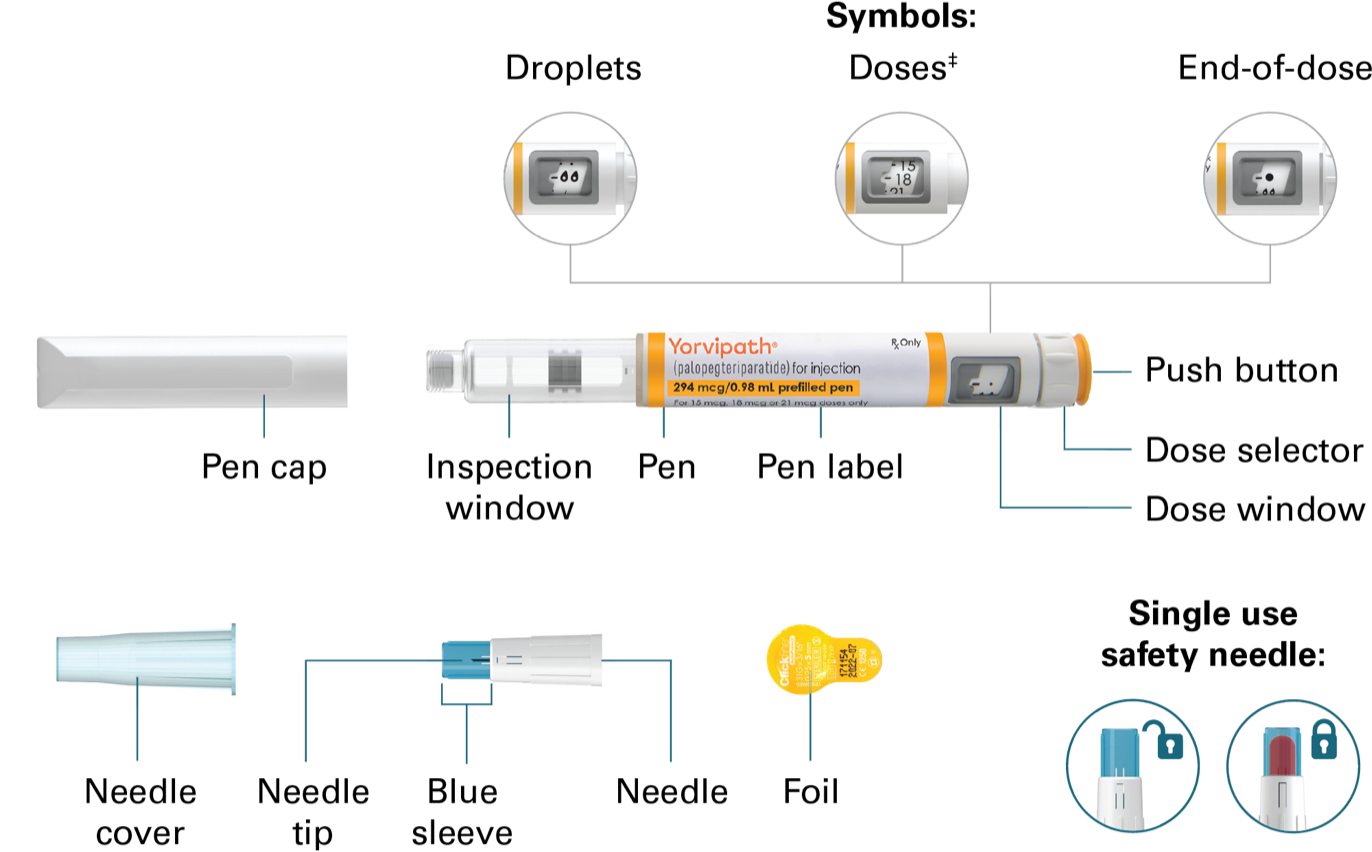Important Safety Information
INDICATION AND LIMITATIONS OF USE
YORVIPATH (palopegteriparatide) is indicated for the treatment of hypoparathyroidism in adults.
- YORVIPATH was not studied for acute post-surgical hypoparathyroidism.
- YORVIPATH’s titration scheme was only evaluated in adults who first achieved an albumin-corrected serum calcium of at least 7.8 mg/dL using calcium and active vitamin D treatment.
CONTRAINDICATIONS
YORVIPATH is contraindicated in patients with severe hypersensitivity to palopegteriparatide or to any of its excipients. Hypersensitivity reactions, including anaphylaxis, angioedema, and urticaria, have been observed with parathyroid hormone (PTH) analogs.
WARNINGS AND PRECAUTIONS
Risk of Unintended Changes in Serum Calcium Levels Related to Number of Daily Injections
Use only one YORVIPATH injection to achieve the recommended once daily dosage. Using two YORVIPATH injections to achieve the recommended once daily dosage increases the variability of the total delivered dose, which can cause unintended changes in serum calcium levels, including hypercalcemia and hypocalcemia.
Serious Hypercalcemia
Serious events of hypercalcemia requiring hospitalization have been reported with YORVIPATH. The risk is highest when starting or increasing the dose of YORVIPATH but may occur at any time. Measure serum calcium 7 to 10 days after any dose change or if there are signs or symptoms of hypercalcemia, and at a minimum of every 4 to 6 weeks once the maintenance dose is achieved. Treat hypercalcemia if needed. If albumin-corrected serum calcium is greater than 12 mg/dL, withhold YORVIPATH for at least 2-3 days. For less serious hypercalcemia, adjust the dose of YORVIPATH, active vitamin D, and/or calcium supplements.
Serious Hypocalcemia
Serious events of hypocalcemia have been observed with PTH products, including YORVIPATH. The risk is highest when YORVIPATH is abruptly discontinued, but may occur at any time, even in patients who have been on stable doses of YORVIPATH. Measure serum calcium 7 to 10 days after any dose change or if there are signs or symptoms of hypocalcemia, and at a minimum of every 4 to 6 weeks once the maintenance dosage is achieved. Treat hypocalcemia if needed, and adjust the dose of YORVIPATH, active vitamin D, and/or calcium supplements if hypocalcemia occurs.
Potential Risk of Osteosarcoma
YORVIPATH is a PTH analog. An increased incidence of osteosarcoma (a malignant bone tumor) has been reported in male and female rats treated with PTH analogs, including teriparatide. Osteosarcoma occurrence in rats is dependent on teriparatide or PTH dose and treatment duration. Osteosarcoma has been reported in patients treated with teriparatide in the postmarketing setting; however, an increased risk of osteosarcoma has not been observed in observational studies in humans. There are limited data assessing the risk of osteosarcoma beyond 2 years of teriparatide use.
YORVIPATH is not recommended in patients who are at increased risk of osteosarcoma, such as patients with:
- Open epiphyses. YORVIPATH is not approved in pediatric patients.
- Metabolic bone diseases other than hypoparathyroidism, including Paget’s disease of bone.
- Unexplained elevations of alkaline phosphatase.
- Bone metastases or a history of skeletal malignancies.
- History of external beam or implant radiation therapy involving the skeleton.
- Hereditary disorders predisposing to osteosarcoma.
Instruct patients to promptly report clinical symptoms (e.g., persistent localized pain) and signs (e.g., soft tissue mass tender to palpation) that could be consistent with osteosarcoma.
Orthostatic Hypotension
Orthostatic hypotension has been reported with YORVIPATH. Associated signs and symptoms may include decreased blood pressure, dizziness (including postural dizziness), palpitations, tachycardia, presyncope, or syncope. Such symptoms can be managed by dosing at bedtime, while reclining. YORVIPATH should be administered initially when the patient can sit or lie down due to the potential of orthostatic hypotension.
Risk of Digoxin Toxicity with Concomitant Use of Digitalis Compounds
YORVIPATH increases serum calcium, and therefore, concomitant use with digoxin (which has a narrow therapeutic index) may predispose patients to digitalis toxicity if hypercalcemia develops. Digoxin efficacy may be reduced if hypocalcemia is present. When YORVIPATH is used concomitantly with digoxin, measure serum calcium and digoxin levels routinely, and monitor for signs and symptoms of digoxin toxicity. Refer to the digoxin prescribing information for dose adjustments, if needed.
ADVERSE REACTIONS
The most common adverse reactions (≥ 5%) in patients treated with YORVIPATH were injection site reactions (39%), vasodilatory signs and symptoms (28%), headache (21%), diarrhea (10%), back pain (8%), hypercalcemia (8%) and oropharyngeal pain (7%).
DRUG INTERACTIONS
Drugs Affected by Serum Calcium
Digoxin: YORVIPATH increases serum calcium, therefore, concomitant use with digoxin (which has a narrow therapeutic index) may predispose patients to digitalis toxicity if hypercalcemia develops. Digoxin efficacy may be reduced if hypocalcemia is present. When YORVIPATH is used concomitantly with digoxin, measure serum calcium and digoxin levels, and monitor for signs and symptoms of digoxin toxicity. Adjustment of the digoxin and/or YORVIPATH dose may be needed.
Drugs Known to Affect Serum Calcium
Drugs that affect serum calcium may alter the therapeutic response to YORVIPATH. Measure serum calcium more frequently when YORVIPATH is used concomitantly with these drugs, particularly after these drugs are initiated, discontinued, or dose adjusted.
USE IN SPECIFIC POPULATIONS
Pregnancy
Available data from reports of pregnancies in the clinical trials from drug development are insufficient to identify a drug-associated risk of major birth defects, miscarriage, or other adverse maternal or fetal outcomes. If YORVIPATH is administered during pregnancy, or if a patient becomes pregnant while receiving YORVIPATH, healthcare providers should report YORVIPATH exposure by calling 1‑844‑442‑7236.
Lactation
Monitor infants breastfed by females treated with YORVIPATH for symptoms of hypercalcemia or hypocalcemia. Consider monitoring serum calcium in the breastfed infant.
You are encouraged to report side effects to FDA at (800) FDA-1088 or www.fda.gov/medwatch. You may also report side effects to Ascendis Pharma at 1‑844‑442‑7236.
Please click here for full Prescribing Information for YORVIPATH.



